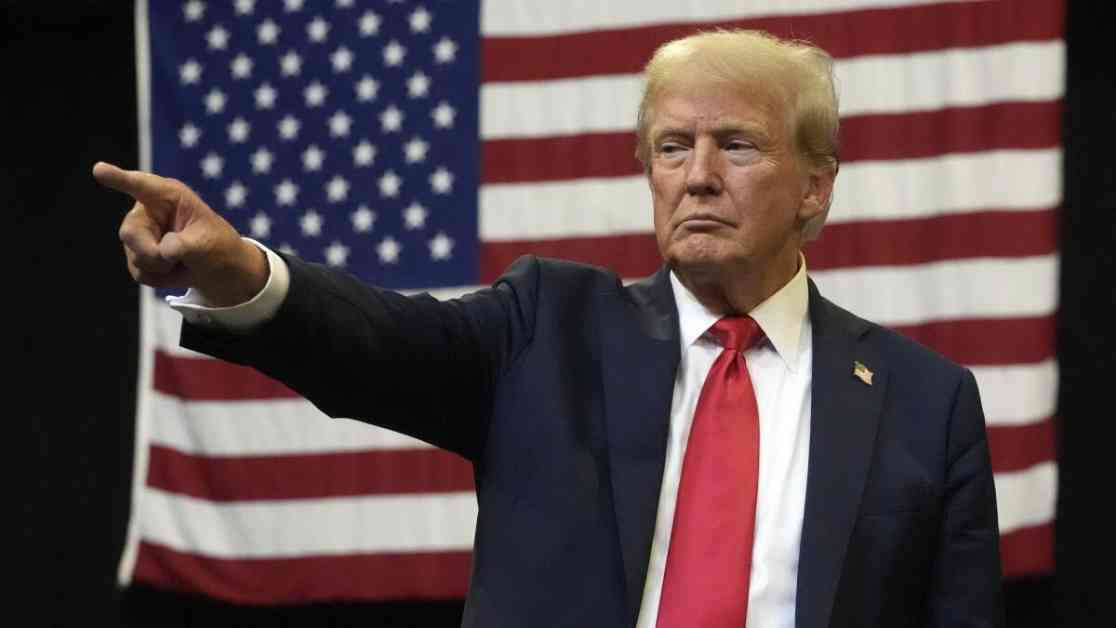Former President Trump’s bold promises to “save” America are met with skepticism and concern as critics question the feasibility and legality of his proposed policies. Trump paints a bleak picture of the United States as a “crime-ridden mess” with the “worst border in the history of the world,” predicting an impending Great Depression and World War III. However, he assures voters that re-electing him will swiftly transform the nation, bringing an end to foreign wars, mass deportations of undocumented immigrants, and a booming economy with skyrocketing incomes and job opportunities for the middle class.
Critics of Trump argue that his grandiose pledges are merely empty rhetoric, masking a dangerous agenda that could dismantle social safety nets, discriminate against marginalized groups, and erode women’s rights. They express concerns about his authoritarian tendencies, citing his own admission to acting like a “dictator” on “Day One” and the potential for a full-scale adoption of authoritarianism in his next term. With conservative playbooks like Project 2025 and Trump’s Agenda 47 hinting at a disregard for constitutional norms and civil liberties, many fear the consequences of a Trump presidency unrestrained by legal constraints.
On Immigration, Trump’s focus remains on border security and deportation efforts, characterizing immigrants as a threat to national security. He vows to complete the construction of a physical border wall, conduct the largest deportation operation in American history, and target sanctuary cities that resist federal immigration enforcement. Trump’s militaristic approach extends to attacking foreign drug cartels and seeking harsh penalties for drug traffickers. Additionally, he plans to eliminate birthright citizenship through executive order, challenging established constitutional precedent.
While Trump’s immigration policies resonate with some supporters, research shows that the majority of Americans disapprove of his first-term initiatives, particularly those that separated families and advocated for a border wall. Critics argue that Trump’s anti-immigrant rhetoric is a divisive strategy aimed at mobilizing racist sentiments among his base. Despite his tough stance on immigration, doubts linger about the practicality and ethical implications of mass deportations, especially given the economic dependence on immigrant labor in various sectors.
On Abortion, Trump’s stance is contentious, as he aims to restrict access to reproductive healthcare by appointing conservative Supreme Court justices who could overturn Roe v. Wade. While Trump takes credit for dismantling abortion rights and empowering states to enact stricter regulations, he stops short of endorsing a nationwide ban. Advocates for reproductive rights condemn his role in curtailing women’s freedoms and warn of the disproportionate impact on marginalized communities.
Trump’s Economic promises include tax reforms benefiting seniors and service workers, funded by increased domestic energy production, improved trade deals, and budget cuts. However, his proposed impoundment authority to withhold federal agency budgets faces legal challenges, raising concerns about his commitment to fiscal responsibility. Critics argue that Trump’s economic agenda prioritizes corporate interests over working-class Americans, pointing to his track record of undermining labor rights and healthcare access.
Regarding Climate Change, Trump’s rejection of environmental programs and support for fossil fuel industries signal a rollback of clean energy initiatives. His skepticism of renewable energy sources and dismissal of the Green New Deal as a “hoax” reflect a regressive approach to addressing climate change. While some experts question the feasibility of Trump’s energy policies, his administration’s dismantling of environmental regulations poses a threat to sustainability efforts.
On Foreign Policy, Trump’s claims of preventing wars and brokering peace deals in Ukraine and Gaza have been met with skepticism, given his track record of military interventions and support for controversial conflicts. His alignment with Israel’s actions in Gaza and anti-Hamas rhetoric raise concerns about his approach to international diplomacy. Trump’s proposal to build an “Iron Dome” defense system in the U.S. is viewed as symbolic rather than practical, highlighting his tendency to use militaristic language for political gain.
In conclusion, Trump’s ambitious promises to “save” America are met with scrutiny and apprehension, as critics question the feasibility and legality of his proposed policies. From immigration reform to economic initiatives and climate change strategies, Trump’s agenda raises concerns about civil liberties, social justice, and environmental sustainability. As voters weigh the implications of his rhetoric and actions, the future of American democracy hangs in the balance.



























